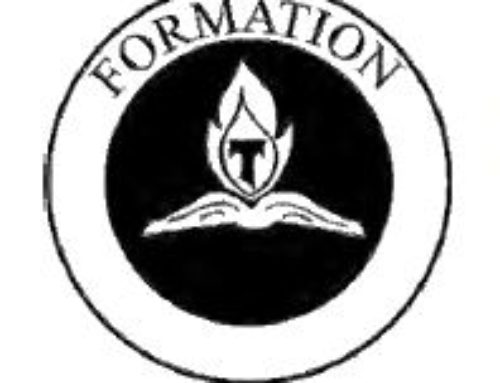By Deacon Tom Bello, OFS
Of course I’m biased, but when I was growing up, my Mom spread the best Thanksgiving dinner anywhere! We were not rich, but Mom always had a huge turkey, plus at least one other meat like an eye of the round roast. We had two kinds of cranberries; at least two kinds of potatoes; numerous salads and vegetables; and usually four different desserts, with ice cream: fresh apple, berry and pecan pies, plus a pound or coconut cake. It was wonderful!
The only problem is now Mom comes to my house for Thanksgiving. It’s my turn to feast her. Wow, what a hard job to match what she used to spread before us!
Luke 9:16-17 reads: “Then taking the five loaves and the two fish, and looking up to heaven, he said the blessing over them, broke them, and gave them to the disciples to set before the crowd. They all ate and were satisfied. And when the leftover fragments were picked up, they filled twelve wicker baskets.”
These words and actions are mirrored at the Last Supper: “Then he took the bread, said the blessing, broke it, and gave it to them, saying, ‘This is my body, which will be given for you; do this in memory of me'” (Luke 22:19).
Jesus himself certainly understood what he was doing. He would teach: “I am the living bread that came down from heaven; whoever eats this bread will live forever; and the bread that I will give is my flesh for the life of the world” (John 6:51). When the Jews disputed how he could give his flesh to eat, Jesus did not change, but only intensified his declaration: “Amen, amen, I say to you, unless you eat the flesh of the Son of Man and drink his blood, you do not have life within you. Whoever eats my flesh and drinks my blood has eternal life, and I will raise him on the last day” (6:53-54).
St. Paul certainly believed in the Real Presence. St. Paul wrote in his first letter to the Corinthians (11:23-24), “the Lord Jesus, on the night he was handed over, took bread, and, after he had given thanks, broke it and said, ‘This is my body that is for you. Do this in remembrance of me.'”
St. Francis certainly had no doubts about this bread being Christ’s body: “Above everything else, I want this most holy Sacrament to be honored and venerated and reserved in places which are richly ornamented,” he wrote in his Testament (Omnibus, p. 67).
St. Francis explained, “I am determined to reverence, love and honor priests and all others as my superiors. I refuse to consider their sins, because I can see the Son of God in them and they are better than I. I do this because in this world I cannot see the most high Son of God with my own eyes, except for his most holy Body and Blood which they receive and they alone administer to others” (Omnibus, p. 67).
Thus we his secular followers must have no doubt that Jesus resides body, blood, soul and divinity in the Most Blessed Sacrament: “Secular Franciscans, therefore, should seek to encounter the living and active person of Christ in their brothers and sisters, in Sacred Scripture, in the Church, and in liturgical activity. The faith of St. Francis, who often said, ‘I see nothing bodily of the Most High Son of God in this world except His most holy body and blood,’ should be the inspiration and pattern of their Eucharistic life” (Secular Franciscan Rule 5).
“The Eucharist is the center of the life of the Church. Christ unites us to himself and to one another as a single body in it. Therefore, the Eucharist should be the center of the life of the fraternity. The brothers and sisters should participate in the Eucharist as frequently as possible, being mindful of the respect and love shown by Francis, who, in the Eucharist, lived all the mysteries of the life of Christ” (General Constitutions Article 14.1).
But when Jesus took the bread, blessed it, broke it and gave it to his disciples to distribute when feeding the five thousand, His work did not stop there.
Nor did His work stop when Jesus took the bread, blessed it, broke it and gave it to his disciples at the Last Supper saying, “This is my body that is for you. Do this in remembrance of me”
No, Jesus then actually took his own physical body, blessed it with his own blood, sweat and tears, broke it on the Cross and gave it to all of us to save us from our sins and open the gates of heaven.
Many times when I hold up the Sacred Cup beside the Priest after the Holy Consecration, but before the Great Amen, I wonder how can I ever repay the Lord for His total Sacrifice? How do I give back?
The answer of course is to try to render in kind. As I have received from my Mom, from Jesus, I must return. With and only with God’s great grace, I must take, bless, break and give. I must take my life, allow Jesus in the sacraments to bless it, break it of my will and give it completely in total service for others. I must try to do as Jesus did, and as Sts. Paul and Francis did in imitation of Christ.
Let us pray: Lord Jesus Christ, we worship you living among us in the sacrament of your body and blood. May we offer to our Father in heaven solemn pledges of undivided love. May we offer to our brothers and sisters lives poured out in loving service of that kingdom where you live with the Father and the Holy Spirit one God for ever and ever. Amen! (Alternative Opening Prayer for the Feast of Corpus Christi)
May the Heart of Jesus in the Most Blessed Sacrament be praised, adored and loved with grateful affection, at every moment, in all the tabernacles of the world, now and until the end of time. Amen
Reflection Questions
- Ultimately, what was the Lord “Taking, Blessing, Breaking, Giving”?
- What did our Lord say that shows that He understood what He was doing?
- What did St. Paul say that shows that he understood what the Lord was doing?
- What did St. Francis say that shows that he understood what the Lord was doing?
- What can Secular Franciscans do to show that they understand what the Lord was doing?
- What do the General Constitutions tell us about the importance of our Lord’s Body and Blood?
- In what ways might our Lord’s Body and Blood become more important in the life of your fraternity?
This is an excerpt from a series of articles by the late Deacon Tom Bello, OFS, former Minister of the National Secular Franciscan Order – USA. “Many of these essays were originally published in TAU-USA, our national newsletter,” said Jan Parker, OFS, current National Minister. “They are excellent for reflection and ongoing formation.” Jan helped Tom publish these essays in book form. It is called For All The Saints: St. Francis’s Five-Point Plan for Salvation and is available from Tau Publishing. These excerpts will appear several times a week on the Secular Franciscans website.



Beautiful. What a blessing Tom was to you all.
From a grateful heart. Angela ofs